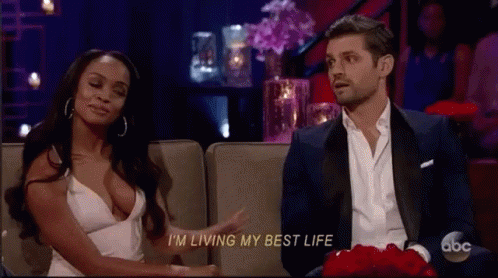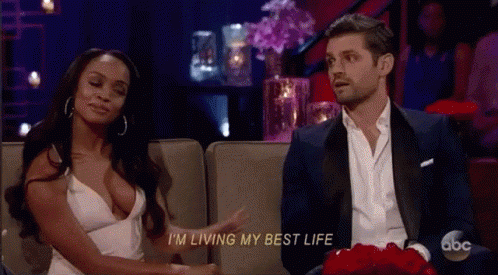There?s something wrong with how we use the expression that has taken over pop culture.

Scroll through Instagram, Twitter, or Facebook and I?m sure you?ll find a handful of captions and posts of people proclaiming to be living their best lives.
Maybe you?ve thought to yourself mid-scroll: ?what does that even mean??
The phrase has been used across social media and in popular culture for awhile now. Turn on the radio and you?re bound to hear Cardi B?s song ?Best Life? at least once during your car ride. Still, like a lot of viral phrases, it?s difficult to pinpoint the precise moment that the expression really took off. Fuel was added to the fire in 2017 on the Bachelorette reunion when Rachel proclaimed to Peter that she?s living her best life without him.
But, the phrase is much older than that. It seems to have been introduced into our worlds by none other than Oprah. The Oprah Magazine published a book back in 2005 titled ?Live Your Best Life,? and in 2010 Oprah hosted an event named ?Live your Best Life.? Her personal brand and mantra is centered around self-growth, reaching new heights, and finding meaning. These are all ideas that we as a society constantly try to work towards, and I think these are concepts that can truly help us elevate and live more fulfilling versions of our lives.
Thus, I think the most beneficial and realistic explanation of what ?living your best life? means is as follows:
One that encompasses reaching new levels of self awareness and self growth, that ultimately leads to taking actions that help you to discover and hone into your interests, talents, and passions.
Living your best life is truly subjective, so an explanation such as this one allows for the unique life experiences that everyone has.
But, this isn?t how the phrase is presented on social media. On Instagram, the phrase illustrates uniformity rather than subjectivity. ?Living my best life? is usually a caption that accompanies an image of perfectly placed food, selfies, and the latest travel destination.
The phrase feels dumbed down, like its value is lost. Does the way we use the phrase on social media and within pop culture align with its most beneficial and realistic conceptualization?
With FOMO and constant comparison to others on social media, it starts to feel like a contest to see who can create the most appealing, extravagant ?living my best life? post. We comment and proclaim that our friends are living their best lives when we see them post photos of them posing with beautiful sunsets in the background. But, social media isn?t a true representation of our lives, our presentation of ourselves online is carefully and strategically planned ? highlighting only our fun, carefree, most successful moments.
The conflation with a person actually working towards living their best life and the quality of their posts on social media platforms is a dangerous one.
It feels like ?best? has a clear definition that?s limiting in this context. Let society and social media tell it, and living your best life means that you?re traveling the world, landed your dream job, got accepted into grad school, etc. Living your best life praises the finish line and ignores all the work it took to get there. Are you still living your best life when you?ve saved extensively for a year just to afford that dream vacation, or were rejected from numerous jobs before you finally landed your current one?
With such an emphasis on large accolades and accomplishments, the phrase doesn?t leave room for the mundane moments in life that are worthy of praise and acknowledgement. To truly be one?s best self, there will be moments of highs and lows. As my dad always reminds me, life is fluid.
It?s impossible to stay on top without experiencing some type of pitfall, and our understanding of ?living my best life? today minimizes the struggles of life that are unavoidable, and encourages the idea that only award-winning moments in life matter. But, it?s impossible for life to only consist of success stories.
One of my favorite podcasts, Therapy for Black Girls, discussed a few months ago the idea of not being where you want to in life, whether that be regarding relationships, career goals, or any aspect of life. In Session 50: This Isn?t What I Imagined, Dr. Joy, the host, asks the question whose story are you trying to fulfill? Is it truly yours, or is it the life that your friends/parents/society/partner tells you is necessary and right for you? Dr. Joy discusses how we often are trying to live up to standards that are imposed upon us by others. While ?living your best life? is encouraging in that it emphasizes bettering yourself and self-growth, one has to consider who decides what ?best? is, and that working towards living one?s best life is different for everyone.
While it?s easy to see the Instagram captions and the Facebook posts of people proclaiming they?re living their best lives and feel the need to compare, ?best? is subjective. It?s more helpful to look at living your best life as a fluid, ongoing process ? not something that has a finite end point. There?s always room to grow and more to learn about ourselves, and this self awareness and growth allows us to continuously become more fulfilled versions of ourselves.


